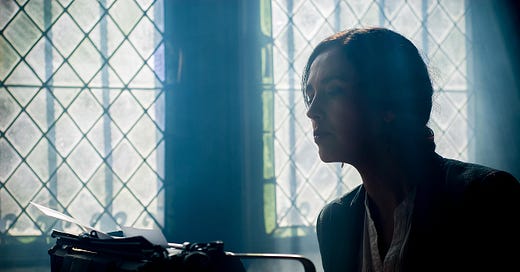I first started writing fiction - as some of you have previously heard - after I finished art college and had no idea how I was going to support my career as an artist. That I would be an artist wasn’t in doubt - I’d always painted, and I’d passed my art degree with flying colours. The only thing in the way was the little matter of being able to afford food, drink and rent.
I racked my brains. Looked with zero enthusiasm at the job vacancies in the local newspaper. Turned over the idea of setting up a part-time cleaning business.
Then I came up with what I thought was a genius plan - why not write a best-selling romance novel? That would support my art career. I loved stories, and I’d devoured romances as a teenager. How difficult could it be?
Ha! How naive I was. Well, I was only 21.
I bought a typewriter, a stack of paper and proceeded to type out one of my fantasies - a story called Star Love - about a young woman (me) who goes to a pop concert and catches the attention of the lead singer of the band while he’s performing on the stage. Beyond the meeting and the inevitable happy ever after ending, I can’t remember what else happened - probably not very much judging by how quickly that novel winged its way back to me with a rejection letter. But it didn’t really matter, because I’d enjoyed writing it so much, I’d well and truly caught the writing bug. From then on, writing quickly overtook art as my number one creative outlet.
To say my friends from art college were baffled is an understatement. They were variously disappointed, dismayed and disapproving. I’m quite sure they laughed behind my back about my attempts to become a romantic novelist. I came to feel as if they no longer knew who I was; that I couldn’t be who I wanted to be with them.
I hesitantly brought the subject up. ‘I do think of you as a writer,’ one friend said. ‘But I also think you’re a good painter.’ A nice thing to say, you’d think, but to me it felt like implied criticism. As if she thought I was wasting my talents.
It was worse still with my boyfriend. Even when I started to get some of those early romance novels published, he resented my writing. It was as if the heroes I wrote about made him feel ‘less’ in some way. As if he felt I needed to create fantasy men to spend my time with because he wasn’t enough for me. (Which, in hindsight was spot on!) The sound of me typing on my old-fashioned typewriter was, to him, like fingernails dragged across a blackboard. It’s a small wonder my typewriter wasn’t hurled out of the window the way my prized pot plant was when we split up.
Many years later, my partner - of twenty years now - never reads my novels. Neither does my son. I shared this fact with a group of writers recently, and they were surprised; even dismayed on my behalf. I didn’t need them to feel sorry for me though, because I don’t feel that way at all. Neither my son or my partner reads novels; they're very much non-fiction guys. And they’re definitely not my target audience. I don’t need people to read my books out of a sense of duty, and I don’t need my partner or my son to enjoy or approve of what I what I write.
I do need - and greatly value - their support though, which I’m very glad to say I have, 100%.
They’ll be there rooting for me when Closest Kept is published on 6th May - I hope you will be too! You can pre-order it here.






My husband hasn't read my novel manuscript. It frees me up to write without concern he'll see himself in one of the characters (which he isn't, but may very well think he is).
I'm so excited for your next book. And my peeps don't read my work either. It's a nice boundary. I don't have to stress about what they think and they don't have to read something they may not like. Then there is always the questions of whether a specific character or situation has anything to do with them. Everyone is the protagonist in their own story ; )